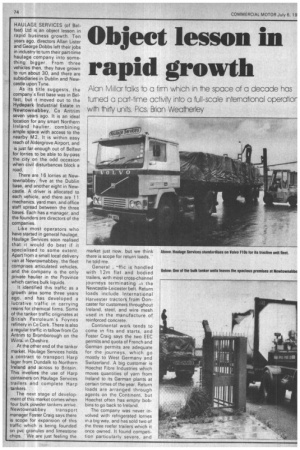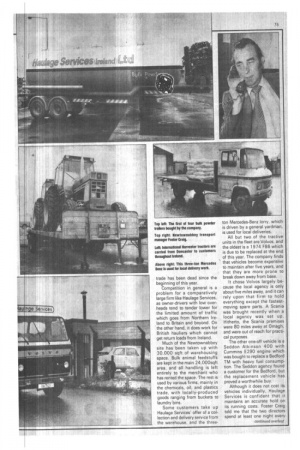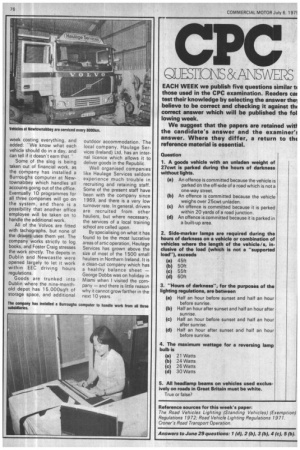Object lesson in rapid growth
Page 76

Page 77

Page 78

If you've noticed an error in this article please click here to report it so we can fix it.
Alan Millar talks to a firm which in ne space of a decade has turned a part-time activity into a 'ull-scale international operatior with thiry units. Pis: Brian Weatherley
HAULAGE SERVICES (of Belfast) Ltd is an object lesson in rapid business growth. Ten years ago, directors Allan Lister and George Dobbs left their jobs in industry to turn their part-time haulage company into something bigger. From three vehicles then, they have grown to run about 30, and there are subsidiaries in Dublin and Newcastle upon Tyne.
As its title suggests, the company's first base was in Belfast, but it moved out to the Hydepark Industrial Estate in Newtownabbey, Co Antrim seven years ago. It is an ideal location for any smart Northern Ireland haulier, combining ample space with access to the nearby M2. It is within easy reach of Aldergrove Airport, and is just far enough out of Belfast for lorries to be able to by-pass the city on the odd occasion when civil disturbances block a road.
There are 16 lorries at Newtownabbey, five at the Dublin base, and another eight in Newcastle. A driver is allocated to each vehicle, and there are 11 mechanics, yard men, and office staff spread between the three bases. Each has a manager, and the founders are directors of the companies.
Like most operators who have started in general haulage, Haulage Services soon realised that it would do best if it specialised to some extent. Apart from a small local delivery van at Newtownabbey, the fleet comprises articulated vehicles, and the company is the only private haulier in the Province which carries bulk liquids.
It identified this traffic as a growth area some three years ago, and has developed a lucrative traffic in carrying resins for chemical firms. Some of the tanker traffic originates at British Petroleum's Foynes refinery in Co Cork. There is also a regular traffic in tallow from Co Antrim to Bromborough on the Wirra: in Cheshire.
At the other end of the tanker market, Haulage Services holds a contract to transport Harp lager from Dundalk to Northern Ireland and across to Britain_ This involves the use of Harp containers on Haulage Services trailers and complete Harp tankers.
The next stage of development of this market comes when four bulk powder tankers arrive.
Newtownabbey transport manager Foster Craig says there is scope for expansion of this traffic which is being founded on pvc granules and limestone chips. -We are just feeling the
market just now, but we think there is scope for return loads,' he told me.
General -ffic is handled with 1 2m flat and bodied trailers, with most cross-channel journeys terminating .o the Newcastle-Leicester belt. Return loads include International Harvester tractors from Doncaster for customers throughout Ireland, steel, and wire mesh used in the manufacture of reinforced concrete.
Continental work tends to come in fits and starts, and Foster Craig says the two EEC permits and quota of French and German permits are adequate for the journeys, which go mostly to West Germany and Switzerland. A big customer is Hoechst Fibre Industries which moves quantities of yarn from Ireland to its German plants at certain times of the year. Return loads are arranged through agents on the Continent, but Hoechst often has empty bobbins to go back to Ireland.
The company was never involved with refrigerated lorries in a big way, and has sold two of the three reefer trailers which it once owned It found competition particularly severe, and trade has been dead since the beginning of this year.
Competition in general is a problem for a comparatively large firm like Haulage Services, as owner-drivers with low overheads tend to tender lower for the limited amount of traffic which goes from Northern Ireland to Britain and beyond. On the other hand, it does work for British hauliers which cannot get return loads from Ireland.
Much of the Newtownabbey site has been taken up with 30,000 sqft of warehousing space. Bulk animal feedstuffs are kept in the main 24,000scift area, and all handling is left entirely to the merchant who has rented the space. The rest is used by various firms, mainly in the chemicals, oil, and plastics trade, with locally-produced goods ranging from buckets to laundry bins.
Some customers take up Haulage Services' offer of a collection and delivery service from the warehouse, and the three
ton Mercedes-Benz lorry, which is driven by a general yardman, is used for local deliveries.
All but two of the tractive units in the fleet are Volvos, and the oldest is a 1974 F86 which is due to be replaced at the end of this year. The company finds that vehicles become expensive to maintain after five years, and that they are more prone to break down away from base.
It chose Volvos largely because the local agency is only about five miles away, and it can rely upon that firm to hold everything except the fastestmoving spare parts. A Scania was brought recently when a local agency was set up. Hitherto, the Scania premises were 80 miles away at Omagh, and were out of reach for practical purposes.
The other one-off vehicle is a Seddon Atkinson 400 with Cummins E290 engine which was bought to replace a Bedford TM with heavy fuel consump. tion. The Seddon agency found a customer for the Bedford, but the replacement vehicle has proved a worthwhile buy.
Although it does not cost its vehicles individually, Haulage Services is confident that it maintains an accurate hold on its running costs. Foster Craig told me that the two directors spend at least one night every
week costing everything, and added: We know what each vehicle should do in a day, and can tell if it doesn't earn that.
Some of the slog is being taken out of financial work, as the company has installed a Burroughs computer at Newtownabbey which handles all accounts going out of the office. Eventually 10 programmes for all three companies will go on the system, and there is a possibility that another office employee will be taken on to handle the additional work.
All of the Volvos are fitted with tachographs, but none of the drivers uses them yet. The company works strictly to log books, and Foster Craig stresses the work strictly. The depots in Dublin and Newcastle were opened largely to let it work within EEC driving hours regulations.
Goods are trunked into Dublin where the nine-monthold depot has 15,000sqft of storage space, and additional outdoor accommodation. The local company, Haulage Services (Ireland) Ltd, has an internal licence which allows it to deliver goods in the Republic.
Well organised companies like Haulage Services seldom experience much trouble in recruiting and retaining staff. Some of the present staff have been with the company since 1969, and there is a very low turnover rate. In general, drivers are recruited from other hauliers, but where necessary, the services of a local training school are called upon.
By specialising on what it has found to be the most lucrative areas of artic operation, Haulage Services has grown above the size of most of the 1 500 small hauliers in Northern Ireland. It is a clean-cut company which has a healthy balance sheet — George Dobbs was on holiday in Miami when I visited the company — and there is little reason why it cannot grow farther in the next 10 years.




























































































































